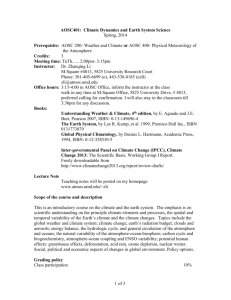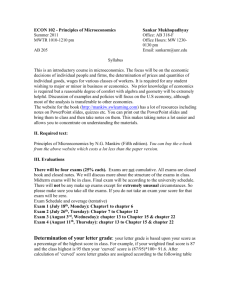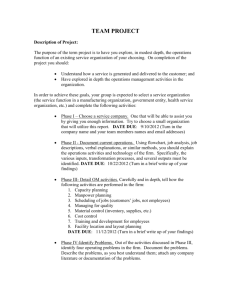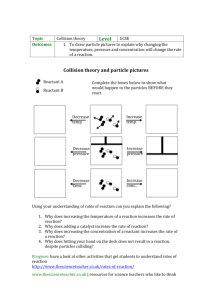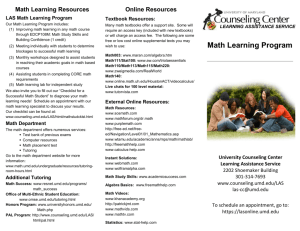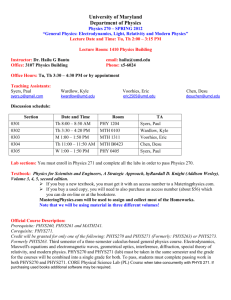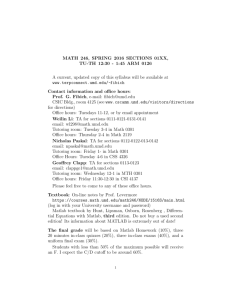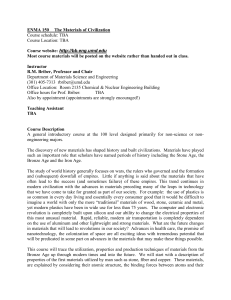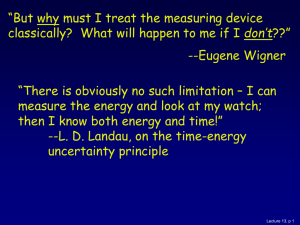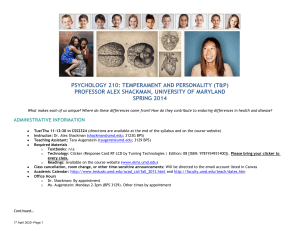Phys420: Principles of Modern Physics
advertisement
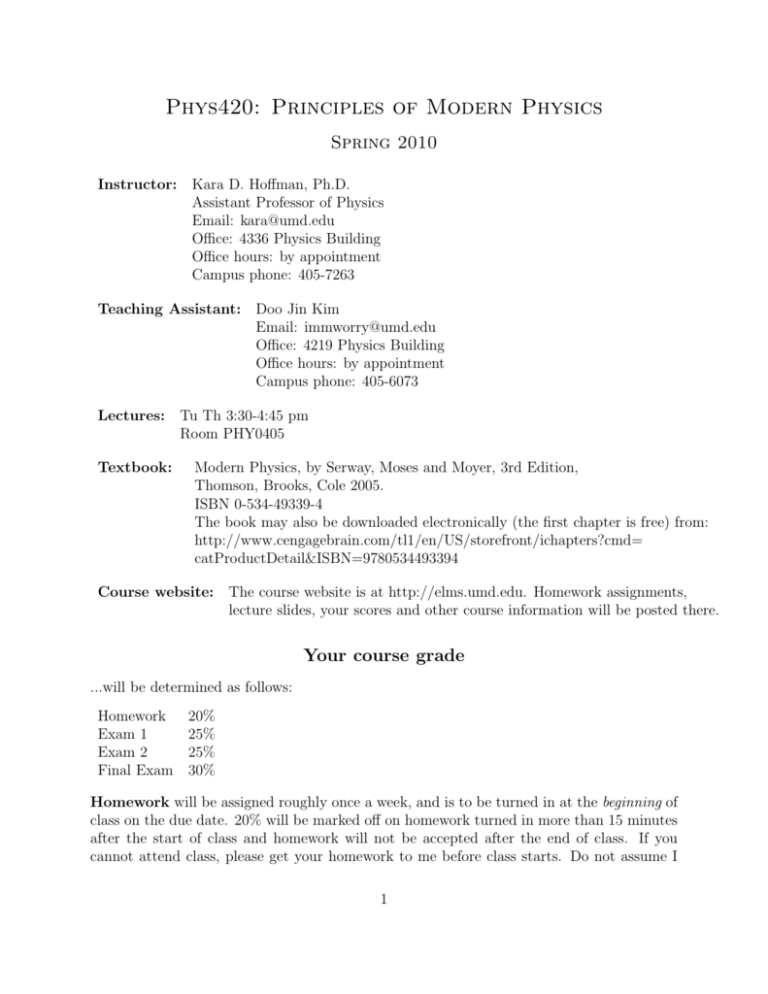
Phys420: Principles of Modern Physics Spring 2010 Instructor: Kara D. Hoffman, Ph.D. Assistant Professor of Physics Email: kara@umd.edu Office: 4336 Physics Building Office hours: by appointment Campus phone: 405-7263 Teaching Assistant: Doo Jin Kim Email: immworry@umd.edu Office: 4219 Physics Building Office hours: by appointment Campus phone: 405-6073 Lectures: Textbook: Tu Th 3:30-4:45 pm Room PHY0405 Modern Physics, by Serway, Moses and Moyer, 3rd Edition, Thomson, Brooks, Cole 2005. ISBN 0-534-49339-4 The book may also be downloaded electronically (the first chapter is free) from: http://www.cengagebrain.com/tl1/en/US/storefront/ichapters?cmd= catProductDetail&ISBN=9780534493394 Course website: The course website is at http://elms.umd.edu. Homework assignments, lecture slides, your scores and other course information will be posted there. Your course grade ...will be determined as follows: Homework 20% Exam 1 25% Exam 2 25% Final Exam 30% Homework will be assigned roughly once a week, and is to be turned in at the beginning of class on the due date. 20% will be marked off on homework turned in more than 15 minutes after the start of class and homework will not be accepted after the end of class. If you cannot attend class, please get your homework to me before class starts. Do not assume I 1 have received your homework unless you hand it to me personally. New assignments will be posted on the course website, along with the solutions to old homework. Homework problems are carefully chosen to highlight some of the important topics covered in lecture, as well as important applications of the material. It is important that you carefully complete and make sure you understand all of the homework. You are encouraged to work with others on homework, however, it is forbidden to blindly copy another person’s work. Exams are meant to test your understanding and ability to apply concepts covered in the course. I therefore do not expect you to memorize constants and equations. You may bring one index card with equations written on it to the first exam, two index cards to the second exam (the card you made for the first exam plus one additional card), and one full sheet of paper to the final exam. I will give you the value of any constants you need. Although the main focus of the exams will be problem solving, all exams will contain at least one question with a written part to verify that you understand and can explain the physical concepts. Academic dishonesty is strictly forbidden and will be dealt with according to University policy. Class attendance I will not take attendance in class. However, you are responsible for all material covered in class. I will try to post any slides that I use, but these are not inclusive. You are also responsible for any notes written on the board, demonstrations, and class discussions. We will occasionally discuss topics not explicitly covered in the book. While I will be happy to help you outside of class with any concepts you are struggling with, I will not be willing to privately recap material that you missed due to unexcused absences. The use of cell phones in class is strictly prohibited. Other resources Many of the topics covered in this class will seem counterintuitive, since we are unable to observe the movement of subatomic particles, for example, with our own eyes. It is very important that you take the time to digest these new ideas. If the explanations in the book are unclear, you might find it helpful to seek an alternative point of view from another book. Also, there are a growing number of animations and applets available on the web. I will sometimes use some of these in my lectures, and I will post links to web resources on the course website. You are encouraged to take a look at these on your own. Sometimes a picture really is worth a thousand words. 2 Tentative Schedule All dates are approximate. Exams will be announced at least two weeks in advance. It is strongly recommended that you read the relevant text before the lecture. Jan Feb Mar Tu 26 2 9 Th 28 4 11 16 23 2 18 25 9 16 23 4 11 18 25 30 Apr 6 13 20 27 May 4 11 1 8 15 22 29 6 Chapter 1: Relativity, Lorentz transformations, spacetime Chapter 2: Relativistic energy and momentum Chapter 3: Quantum theory of light, blackbody radiation, compton scattering, photoelectric effect... Chapter 4: Particles Chapter 5: wave particle duality and a review of wave phenomena Exam 1: Chapters 1-4 (date is tentative) waves continued... Chapter 6: Quantum mechanics in one dimension, QM oscillators and the particle in a box Spring Break, no class Chapter 6 continued Chapter 7: tunneling and reflection Chapter 7 continued Chapter 7 continued Chapter 8 The two dimensional particle in a box and the hydrogen atom Exam 2: Chapters 5-7 (date is tentative) Chapter 9: Atomic structure atomic structure, continued... Chapter 10: Quantum statistics special topics: solid state physics and/or nuclear and particle physics last day of class Wednesday May 19, Final Exam, Location TBA 3
